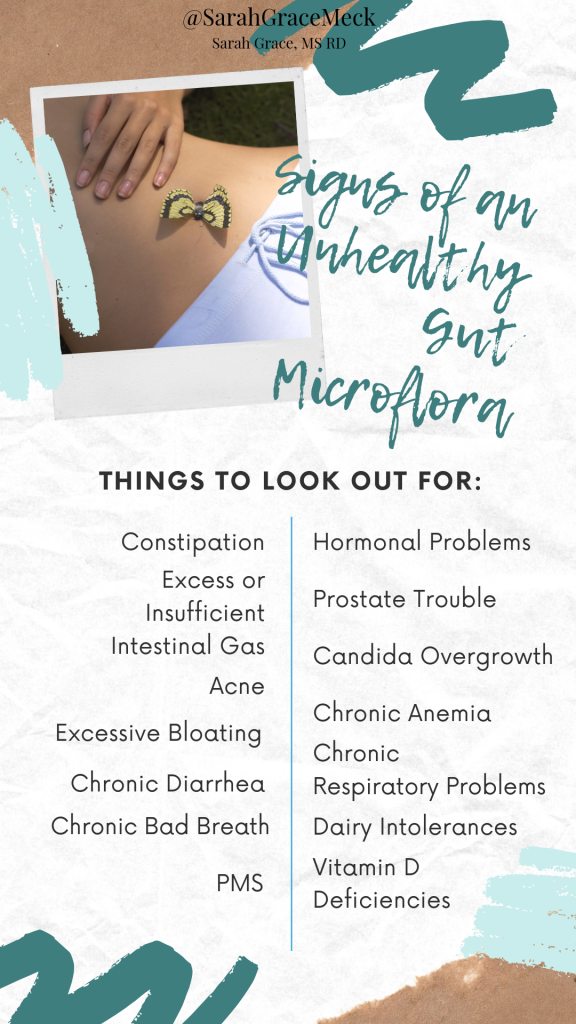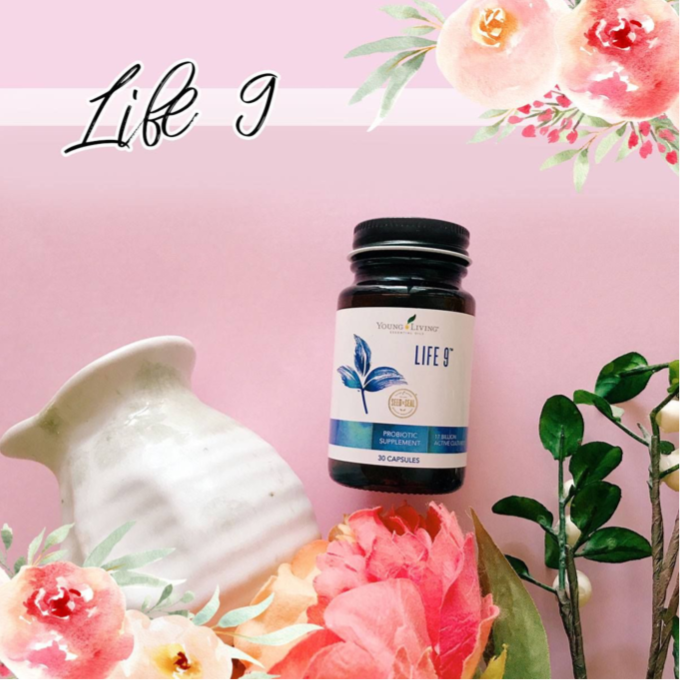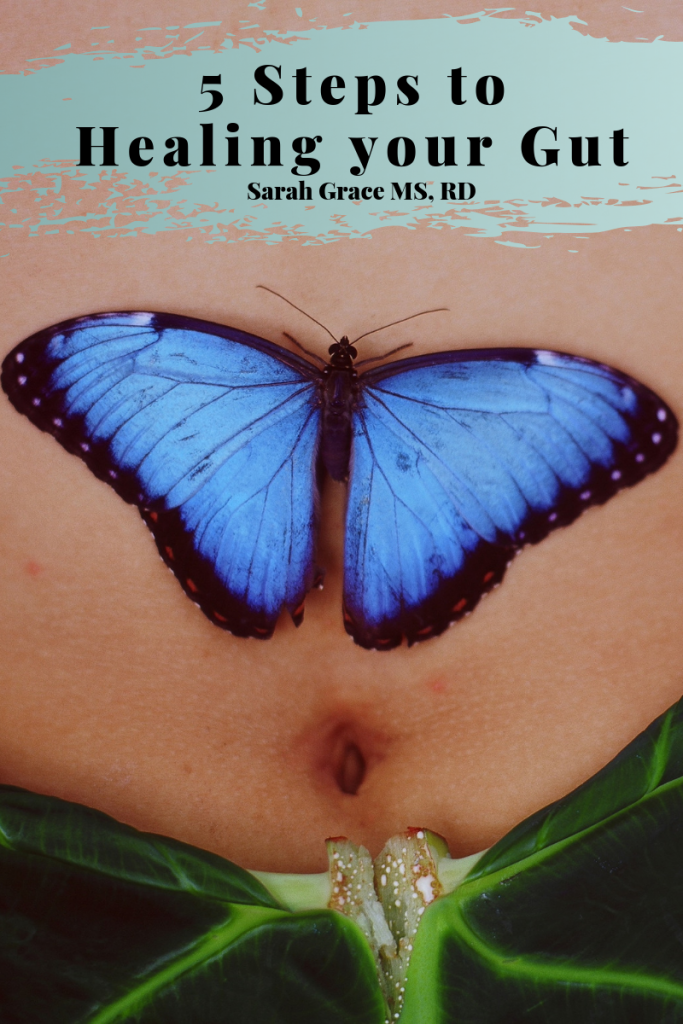Gut health is so key! Recently, I’ve been researching all things for the best gut microflora I can, and I want to share with you what I’ve learned along the way as a registered dietitian.
What will we talk about today?!
We will cover the importance of gut health, signs and symptoms your gut microbiota may be imbalanced, Prebiotics vs. Probiotics, and natural ways to balance out your gut health, before getting into the 5 Steps to Improve Your Gut Health and Digestion.
If you want audio, listen to the podcast below! And watch the video if you want to go into even MORE depth on all there is to know about gut health and healthy digestion.
Podcast: Improving Your Guth Health and Digestion
Video: Gut Health 101 Online Class Replay
WHY A HAPPY GUT MATTERS.
Did you know that 80-90% of your immune system resides in your gut? Our gut flora is the game changer in managing our immunity, and a lot of it has to do with the quality and diversity of the bacteria in our gut.
Do you think about the bacteria in your gut very often?
It sounds like a silly question, but if you haven’t thought about it before, I encourage you to start thinking about it now!
In the medical world, the connection between our immune systems and the state of our guts is rapidly becoming a big point of research! Correlations are even being found between those with different diseases and the state of their gut. Those with a healthy microbiome—a gut filled with good and diverse bacteria — have stronger immune systems than those who have less diverse bacteria or who have a GI system overloaded with harmful bacteria. Gut health is being linked to all types of diseases too! From cancer, IBS, autoimmune diseases, and more. When our immune systems are out of whack, it can even impact our emotions. So having a happy gut is vital to ongoing health!
Here are some signs that you might have an imbalance of healthy gut flora
(aka too much of the bad stuff!):

Do you experience anything on this list?
Then it may be time to consider how you can support the gut and make sure we are feeding all that good bacteria so it can do its job!!
What wreaks havoc on the gut?
The things that contribute to poor gut health include, but are not limited to the following:
- Refined carbohydrates
- Processed Food
- Antibiotics
- Increase age
- Poor overall Diet
- Poor lifestyle choices
- Artificial sweeteners
- Chronic stress
- Chronic infections
- Food sensitivities and allergies
When things go wrong in the balance of intestinal organisms, the consequences can be huge! Negative changes in the intestinal microbiome are firmly associated with chronic diseases that include inflammatory bowel disease, cancer, cardiovascular disease, and metabolic syndrome. Scientists are even now recognizing that allergic disorders, asthma, and even obesity are also related to an unhealthy population of intestinal bacteria. Due to modern diets and lifestyle, as well as environmental factors such as pollution and the overuse of antibiotics, the beneficial bacteria in your microbiome is at risk which can lead to an increased incidence in metabolic and inflammatory chronic diseases. Even simple aging gradually shifts your intestinal bacterial population towards a disease-promoting, rather than a disease-preventing, state. Just think about it—the “pro” in probiotic literally means “life” or “to bring forth.”
Probiotics literally mean to bring forth life.
PRE VS PRO
Prebiotics are non-digestible ingredients that act as the food of probiotics and the helpful microorganisms in the gut. They are found in foods such as bananas, onions, garlic, asparagus, leeks, artichokes, soybeans and whole wheat foods.
Prebiotics can be consumed alone to stimulate microorganisms already found in the gut, or with probiotics.
Studies show that prebiotics can increase the proportion of Bifidobacteria and Lactobacilli. Bifidobacteria is associated with improved health by inhibiting the growth of pathogenic bacteria, modulating the immune system, producing digestive enzymes, repressing the activities of rotaviruses, and restoring microbial integrity of the gut microbiota following antibiotic therapy.
The benefits of a high-fiber diet that includes whole grains, vegetables, fruits, and legumes are well established. As research on fibers with prebiotic properties continues, they can be recommended as part of daily fiber intake; however, it’s important to encourage consumption of fiber from a variety of sources.
Probiotics are live bacteria that are either the same as or similar to the bacteria found naturally in the human body and may be beneficial to health and aid digestion. They’re often referred to as “good bacteria” or “helpful bacteria.”Many products sitting on store shelves carry the label “probiotic,” but all too often they don’t meet qualifying criteria for probiotics, such as defined contents, viability at the end of shelf life, and evidence of health benefits.
Probiotics occur in fermented dairy foods including yogurt, kefir products and aged cheeses, which contain live cultures (look for the words “live and active cultures” as not all dairy products contain probiotics.)
Lesser-known food sources of probiotics include kimchi, sauerkraut, miso, tempeh, fermented vegetables and soy beverages.
“Food is central, but supplements can be helpful,” Swift adds. Most notable in supporting gut health are supplements containing probiotics or prebiotics. Though the number of studies is limited, probiotics have been shown to maintain gut health and prevent chronic bowel diseases such as IBD and restore leaky gut.
LIFE 9:
Life 9 is an incredible probiotic of 17 billion live cultures from 9 beneficial bacteria strains that promotes healthy digestion, supports gut health, and helps maintain normal intestinal function for overall support of a healthy immune system.
This product is specially designed with delayed-release capsules, a dual-sorbent desiccant, and a special bottle and cap that ensure your Life 9 stays fresh and effective

To learn more about these amazing products, click here.
Digestive Enzymes:
Enzymes are the keys to life itself, without them, we no longer exist. Over 300 enzymatic reactions occur in the body every second. We NEED enzymes. In order to break down food efficiently and effectively, your body needs a sufficient supply of digestive enzymes. Some of these digestive enzymes come from the pancreas, others are produced in the stomach, and still others are secreted by the salivary glands in the small intestines. Raw foods contain natural enzymes that make their own digestion easier, but the more refined foods you eat, the more digestive enzymes your body must produce on its own to absorb nutrients properly.
The definition of an enzyme is:
“A protein chemical that accelerates a chemical reaction in the body without being consumed in the process.”
We need enzymes for our very existence. Just as the life process depends on oxygen, it also depends on enzymes. While oxygen is fuel to the body, enzymes are the parts that control the rate and speed of the energy output of each cell. Enzymes are catalysts. They energize you by helping to start your day and keep you going. They are needed for every chemical reaction in the body.
Vitamins, minerals, and other nutrients cannot be used effectively without enzymes, and many times our bodies don’t produce the amount of enzymes that are needed in order for our bodies to properly absorb the nutrients and use energy effectively. The function of the immune system depends upon the presence of enzymes as well.
The body works to produce enzymes needed for the smooth operation of the immune system. Enzymes are destroyed by heat and processing, so in an ordinary diet, we rarely get the enzymes we need from food. Did you know that in the 12th week of gestation, the baby receives it (Dr. DicQie Fuller, The Healing Power of Enzymes).
Eating a diet with plenty of raw foods will give us some very great enzymes, but even raw foods will lose their enzymes as they sit and oxidize. Fresh is always best when it comes to food, but supplementation is also something very important to consider.
Other Ways to Naturally Support Your Gut Health:
- Digize Oil: an oil in the premium starter kit that I rub on my tummy anytime I’m feeling the need for digestion support or feel bloated!
- Peppermint Oil: another oil in the premium starter kit that I ue for EVERYTHING, and keep in my purse daily! From nausea, to cramping, to headaches, to just wanting a little fresh breath, this goes everywhere!
- Comfortone: I talk in the video about how POOPING (yes I said that), is key for ridding toxins. If you aren’t going everyday or at least every other day, consider this Young Living supplement to naturally get things moving 🙂
- Digest & Cleanse: A great Young Living supplement to start out with if you’ve been actually experiencing gut health issues, to clean everything out and aid with digestion in the process.
- Ningxia: my little shot of wolfberry juice each morning packed with antioxidants! Time to close those nutritional gaps happening from environmental factors/food processing/modern diets! Find out more about how I use this in my instagram post here!
- Lifestyle: Movement, balanced diet, avoiding under/overeating
- Click here for oil info!

5 Steps to Healing Your Gut:
1) Moderate Sugar Intake.
Refined carbohydrates, sugar and processed foods create an environment in your gut flora where bad bacteria thrive. Strive to get your carbohydrates from veggies and fruits and have plenty of protein and healthy fat at your meals (FreshFitnFIVE meals and snacks are key.)
Other than that, I like to always try to replace refined carbohydrates like white bread, white rice, and pasta with whole grain or veggie options. Keep track of the desserts you allow yourself to have and how much you allow.
It’s these simple sugars that the bacteria loooove feeding on. If we can just reduce that, we’re already setting ourselves up for success.
2) Add More fermented foods into your diet
A poorly colonized gut may originate at birth, or it may be due to a nutrient-poor diet, or repeated courses of antibiotics (that kill off both the bad and the good bacteria).
To re-inoculate the gut, add fermented foods to your diet, or consider taking strain-specific probiotics. To maintain your healthy gut, you need to feed the good bacteria the food they love. These are referred to as prebiotics, which are nondigestible carbohydrates that help your bacteria flourish. Prebiotics can be found in artichokes, garlic, beans, oats, onions, asparagus, or any green leafy vegetable.
Can I get a big round of applause for FIBER?!
To maintain optimal colon health, I recommend consuming between 20 and 30 g of fiber per day.
Foods with probiotics include yogurt, kefir, sauerkraut, tempeh, kimchi, and even pickles. If you’re not accustomed to eating probiotic foods, I recommend starting off with one small amount (½ cup) per day and working your way up to a probiotic-containing food with every meal.
3) Supplement with the Key Gut Health supplements
The supplements I recommend the most when it comes to gut health are a probiotic, multivitamin/nutritional support to close gaps, and omega 3. We have all three of these that are RD Approved in our company that you can learn about more here.
Nearly everyone can benefit from supplementing with a good quality probiotic, especially if you are not including fermented foods. Probiotics boost the good bacteria in your gut.
Omega 3’s targets the inflammation in your gut and heals it. Together, the combination of these three supplements promote healthy intestinal lining and proper digestion by rebuilding that intestinal lining and restoring the good bacteria.
Effective probiotic supplements are those that deliver 30+ billion live organisms per dose and contain a combination of different strains of Lactobacillus and Bifidobacterium. Essential oil supplements made from thyme, oregano, and mint are also known for their antifungal properties.
Like I said, Life 9 is the way to go in my opinion!
4) Manage your stress.
Because your gut is intricately linked to your state of mind, stress affects your gut health. Diet affects this too, but stress is still a major contributing factor to so many different diseases and imbalances within our bodies.
Remember, if you’re ever feeling stressed, there are so many things you can do to get your cup filled once again. It’s so important for us to be feeling our best to be able to do our best, and give the most we can.
If you need inspiration, check out my blog post on stress management.
5) Don’t let food sensitivities go unchecked.
For some people, food sensitivities and/or allergies may increase inflammation and damage to the intestinal tract. The BIG FIVE food allergens are: gluten, dairy, eggs, soy, and nuts.
This may seem obvious, but if you know you have a food allergy or sensitivity, completely avoiding the food is better for your gut. In personal coaching sessions, we help clients determine if they have any food allergies or sensitivities that may be impairing gut health and/or standing in the way of reaching their goals.
By implementing these strategies, you can rebuild, repair and support your gut, which in turn gives you life and energy.
So there are my top tips and advice as a Registered Dietitian for Gut Health!
To buy oils and start your journey, click here!
IF YOU WANT TO LEARN HOW TO CREATE YOUR OWN FRESHFITNHEALTHY LIFE, CHECK OUT MY MINI COURSE HERE OR MY NUTRITION COACHING HERE!
